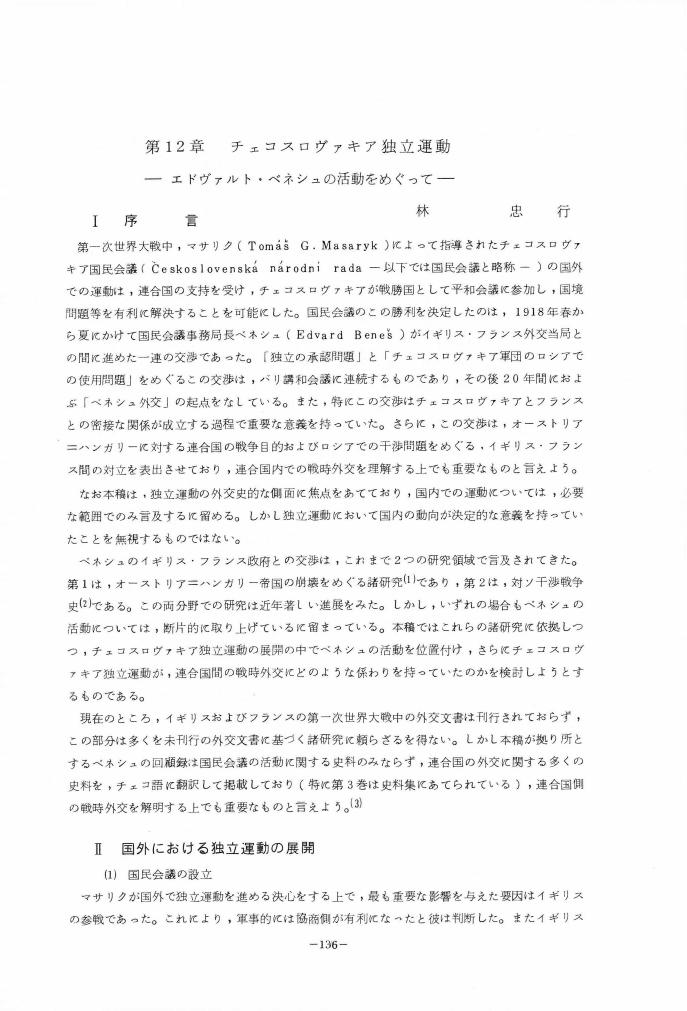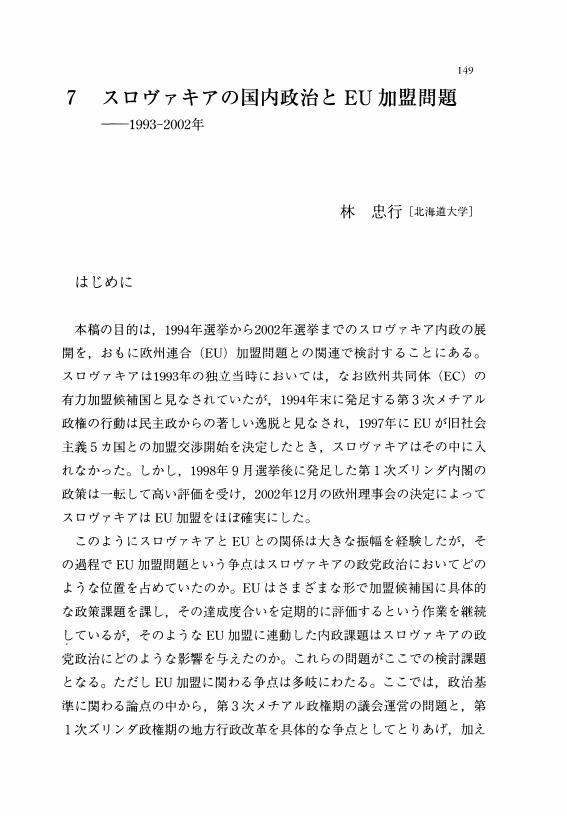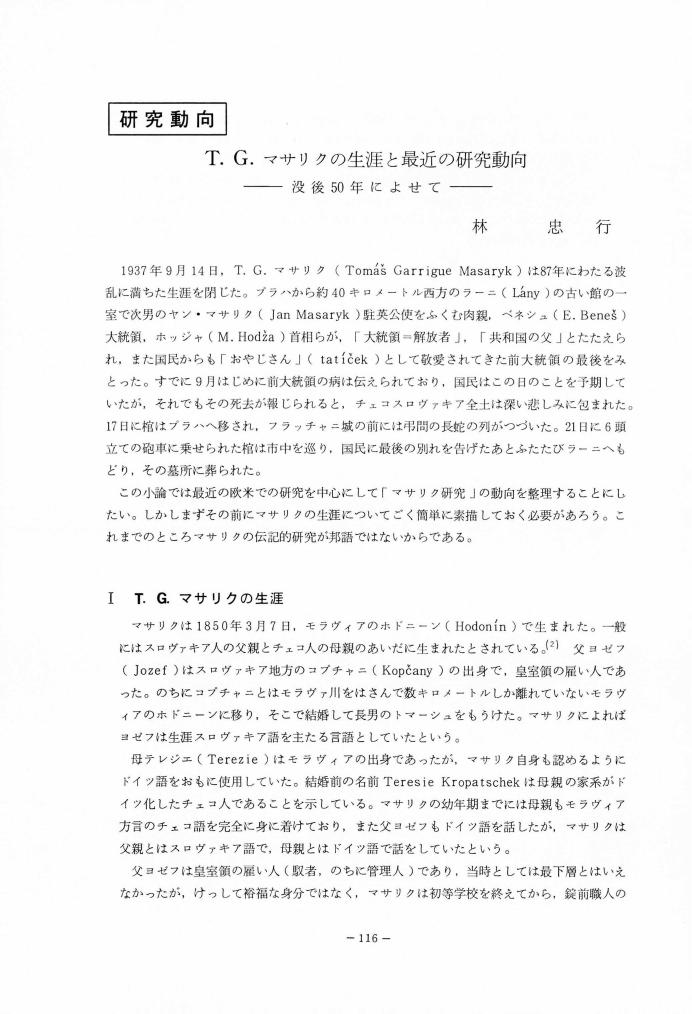2 0 0 0 OA 第12章 チェコスロヴァキア独立運動―エドヴァルト・ベネシュの活動―
- 著者
- 林 忠行
- 出版者
- 東欧史研究会
- 雑誌
- 東欧史研究 (ISSN:03866904)
- 巻号頁・発行日
- vol.1, pp.136-150, 1978 (Released:2017-09-28)
- 被引用文献数
- 1
1 0 0 0 OA 7 スロヴァキアの国内政治とEU加盟問題 ―1993-2002年
- 著者
- 林 忠行
- 出版者
- 日本比較政治学会
- 雑誌
- 日本比較政治学会年報 (ISSN:21852626)
- 巻号頁・発行日
- vol.5, pp.149-171, 2003-06-25 (Released:2010-09-09)
- 参考文献数
- 39
1 0 0 0 OA チェコスロヴァキア建国とロシア革命
- 著者
- 林 忠行
- 出版者
- ロシア・東欧学会
- 雑誌
- ロシア・東欧研究 (ISSN:13486497)
- 巻号頁・発行日
- vol.2018, no.47, pp.1-16, 2018 (Released:2019-10-08)
- 参考文献数
- 33
This paper outlines the movement for an independent Czechoslovak state during the First World War and examines how it was affected by the Russian revolutions of 1917. After the outbreak of the War, only a limited number of Czech and Slovak leaders took up the cause for an independent state, while the majority remained loyal to the Habsburg Monarchy. In 1916, one of the early independence leaders and the first president of Czechoslovakia, T. G. Masaryk, founded the Czechoslovak National Council (CNC) at Paris with the aim of securing the support of the Allied countries. Yet since Allied governments regarded the Habsburg Monarchy as necessary for keeping the balance of power in Europe, they avoided making any commitment to support the CNC and, instead, sought a separate peace with Austria-Hungary. Consequently, the CNC could not achieve any notable results in their negotiations with the Allied governments until April 1918.Just after the outbreak of the War in 1914, Czech and Slovak settlers and emigrants living in Russia joined the war against the Central Powers as a part of the Russian army. The Russian Imperial Governmdent supported Czechs and Slovaks who were loyal to the Russian Empire, but they made no commitment to the independence of the Czechoslovak state. Meanwhile, the Russian state also barred Masaryk, a vocal critic of Czarism, from entering the country. After the March Revolution of 1917, however, Masaryk gained entry to Russia, and he subsequently established his leadership among the Czechs and Slovaks there. He also mobilized newly-freed Czech and Slovak prisoners of war into what later became known as the “Czechoslovak Legion.”In the Bohemian Lands, the Russian March Revolution promoted the rise of radical nationalists who claimed the independence of the Czechoslovak state from Habsburg Monarchy. Between January to July 1918, they gradually expanded their influence in the Czech political circles. Yet they lacked sufficient power to overthrow the Habsburg regime on their own. This situation eventually changed when, in April 1918, the negotiations for a separate peace between the Allied Powers and Austria-Hungary miscarried, and, subsequently, the French government turned to openly support anti-Hapsburg movements including the CNC.After the Bolshevik November Revolution, Soviet Russia and the Central Powers signed the Brest-Litovsk treaty in March 1918. With the eastern front now closed to the Czechoslovak Legion, Masaryk instead decided to transfer his troops to the western front through Vladivostok. On their way to Vladivostok, however, the Legion revolted against the Bolsheviks. This was followed by the Siberian Expedition by the United States and Japan in August. After the outbreak of the rebellion, the CNC was officially recognized by the Allies, and it was regarded as a de facto government by the end of the War. These favorable circumstances led Czechoslovak leaders to declare the independence of the new state and established a new government with exiled leaders at the end of October of 1918.
1 0 0 0 OA 東中欧諸国と米国の単独主義 ―イラク戦争への対応を事例に―
- 著者
- 林 忠行
- 出版者
- ロシア・東欧学会
- 雑誌
- ロシア・東欧研究 (ISSN:13486497)
- 巻号頁・発行日
- vol.2004, no.33, pp.47-58, 2004 (Released:2010-05-31)
This article aims to analyze the responses of the Visegrad Four countries (Poland, the Czech Republic, Slovakia and Hungary) to the Iraq War which started on March 20, 2003. Central and East European countries, including these four countries, were considered to be“pro-American, ”particularly as demonstrated by their leaders' signatures to“the Letter of Eight”or“the Declaration of the Vilnius Ten, ”issued at the end of January, and at the beginning of February 2003, respectively.U.S. unilateralism was particularly notable during the period between November 2002, when the UN Security Council adopted resolution 1441, and May 2003, when the US declared an end to major combat in Iraq, and the UN Security Council adopted resolution 1483. Specifically during this period responses of the Visegrad Four countries to the crisis in Iraq differed significantly from one another. Poland, for example, sent its special forces unit (GROM) to Iraq at the beginning of the War. The Czech and Slovak Republics deployed their NBC weapon response units in Kuwait, however they did not engage militarily in Iraq. Hungary allowed the U.S. to use an airbase located in its territory as a training ground where Iraqi opposition members were trained by U.S. forces as police officers and interpreters, but it did not send any military units to the Middle East during this period.The military measures taken by the four countries varied in accordance with the different agendas of their respective key parties in parliament. Generally speaking, the main pro-American factions were the Trans-Atlanticists within the center-right parties, who oriented themselves toward mainstream European Christian democrats or liberal democrats. Realism among center-left social democratic parties, especially the parties in power, was another factor which encouraged conciliatory attitudes toward U.S. policy and the crisis in Iraq. At same time, however, a considerable group of social democrats opposed U.S. unilateral military actions in Iraq because of their high regard for maintaining multilateralism in respect to agreements established by international institutions, such as the UN, NATO or the EU. Therefore, center-left parties faced a dilemma in evaluating whether or not to support military action in the Middle East.Extreme leftists, nationalists and Catholic traditionalists were almost universally opposed to dispatching troops to the Middle East. However, most of these were only“protest parties”which did not have the actual ability to influence decision-making in parliament. One of the key factors which inhibited Central and East European participation in the U.S. military's intervention in Iraq was in fact heavy criticism leveled by populist opposition parties. These parties were sensitive to public criticism of U.S. unilateral military activity in Iraq and thus blocked local involvement therein.Thus, the differing responses of each country to the Iraq War can be viewed as a reflection of local political dynamics between the Pro- and Anti-American forces within each country's internal politics.
1 0 0 0 OA 東中欧諸国における左派政党の位置
- 著者
- 林 忠行
- 出版者
- ロシア・東欧学会
- 雑誌
- ロシア・東欧学会年報 (ISSN:21854645)
- 巻号頁・発行日
- vol.1996, no.25, pp.20-30, 1996 (Released:2010-05-31)
- 参考文献数
- 20
1 0 0 0 OA T. G. マサリクの生涯と最近の研究動向 ―没後50年によせて―
- 著者
- 林 忠行
- 出版者
- 東欧史研究会
- 雑誌
- 東欧史研究 (ISSN:03866904)
- 巻号頁・発行日
- vol.10, pp.116-126, 1987 (Released:2017-09-28)
1 0 0 0 OA パリ平和会議の期間におけるチェコスロヴァキアと「ロシア問題」
- 著者
- 林 忠行
- 出版者
- 北海道大学スラブ研究センター
- 雑誌
- スラヴ研究 (ISSN:05626579)
- 巻号頁・発行日
- vol.30, pp.71-94, 1982-10-28
- 著者
- 林 忠行
- 出版者
- 一般財団法人 日本国際政治学会
- 雑誌
- 国際政治 (ISSN:04542215)
- 巻号頁・発行日
- vol.2013, no.172, pp.172_169-172_172, 2013-02-25 (Released:2015-03-05)
- 著者
- 田村 伸行 菊池 健人 守屋 雅隆 小林 忠行 島田 宏 水柿 義直
- 出版者
- 一般社団法人電子情報通信学会
- 雑誌
- 電子情報通信学会技術研究報告. SDM, シリコン材料・デバイス (ISSN:09135685)
- 巻号頁・発行日
- vol.109, no.423, pp.47-52, 2010-02-15
- 参考文献数
- 10
我々は,強磁性体(FM)のリード電極を持つ単一電子トランジスタ(SET)の磁気抵抗比(MRR)に関する報告を行う.常伝導体(NC)の島電極を持つ強磁性単一電子トランジスタ(FM/NC/FM-SET)と超伝導体(SC)の島電極を持つ強磁性単一電子トランジスタ(FN/SC/FM-SET)をそれぞれ作製し,測定した4状態のIV特性からMRRを算出した.4状態とは,SETのIV特性のしきい値電圧が最小(SET-ON状態)または最大(SET-OFF状態)と,リード電極間の磁化方向が平行状態または反平行状態とを組み合わせた,SET-ON状態・平行状態,SET-ON状態・反平行状態,SET-OFF状態・平行状態,SET-OFF状態・反平行状態である.FM/NC/FM-SETのMRRは強磁性体の偏極率から計算される理論値の範囲内だったのに対し,FM/SC/FM-SETのMRRは理論値を超える値となった.また,これらのSETでは,島電極の材料によらず,SET-OFF状態のMRRが,SET-ON状態のそれよりも増大する,磁気抵抗比増大効果が確認された.磁気抵抗比増大の発生メカニズムとして提案されているコトンネリングによるモデル計算を行ったところ,実験結果をおおよそ再現した.
1 0 0 0 チェコスロヴァキアにおける人権運動の展開と全欧安保協力会議
1)1977年に始まるチェコスロヴァキアでの人権運動、憲章77はそれ以降の信国における異論派の運動の中心となった。憲章77は、既存の政治体制に対し、他の政治的選択肢を提示するという意味での「政治活動」を避け、体制が承認した国際規範や宣言、言体的には世界人権宣言、ふたつの国際人権規約、ヘルシンキ宣言などを論拠に、それらの内容を国内で実施するよう求めた。この点に運動の最大の特色があった。2)当初、憲章77のヘルシンキ宣言とその後の全欧安全協力会議(CSCB)に対する期待は、必ずしも大きなものではなかった。しかし、その後、CSCEは憲章77の運動の基本的な支柱となる。CSCEは拘束力の弱いプロセスにすぎなかったが、憲章77の主張が西側諸国政府によってとりあげられることによって、国際的な場でその主張は政府の立場と対峙できた。また、その過程を通じて西側のNGOとの接触が深まった。こういった意味において、CSCEは憲章77の運動の「国際化」を可能にした。3)また、CSCEが人権だけでなく、平和や環境など広範な問題を扱っていたことから、その影響下で憲章77が「人権」をより広い文脈でとらえるようになった。少なくとも運動はCSCEとのかかわりの中で、全欧州的な視野を獲得したといってよいであろう。4)1989年の同国での政治変動において、憲章77が育てた人脈は大きな役割を果たし、また現在の政府にも多くの人材を送り込んだ。しかし、89年政変を単線的に憲章77の運動もしくはCSCEと結び次けることには慎重でなければならない。この政変は、国際的政治・経済環境の変容、国内体制の分裂と体制の自壊といった多様な結果生じたからである。とはいえ、政治変動初期において、「市民フォ-ラム」などが示した理念は多くの点で憲章77が積み上げてきた議論を引き継いでいる。少なくとも、理念的には、憲章77とCSCEは89年政変に深く結び付いている。
1 0 0 0 OA パリ平和会議の期間におけるチェコスロヴァキアと「ロシア問題」
- 著者
- 林 忠行
- 出版者
- 北海道大学スラブ研究センター
- 雑誌
- スラヴ研究 (ISSN:05626579)
- 巻号頁・発行日
- no.30, pp.p71-94, 1982
1 0 0 0 東欧おける地域社会形成と拡大EUの相互的影響に関する研究
本研究では東欧(旧ソ連のロシア以外のヨーロッパ部分を含む)地域社会全般を射程に入れ、EU統合が及ぼす影響、そして逆にEU拡大がEUに与える影響について包括的な研究を組織した。その中でハンガリー地位法制定を契機として全欧州的な問題となった主権国家論争を取り上げ、欧州統合における主権国家と国民、そして少数民族問題という具体的な論題を巡る国際会議を、本研究計画の総決算という意味を込めて、2004年10月にハンガリーのブダペストで開催した。この会議には日欧米だけでなく、インドやトルコを含む世界12カ国から研究者が参集し、さらに欧州で民族問題を担当する実務専門家も招聘して議論を深めた。この会議は東欧の少数民族問題を理論的、包括的かつ具体的に論ずる貴重な機会であったため、OSCEなどの全欧州的な国際組織から多くの傍聴者が参集し、ハンガリーのマスメディアも大きく取り上げた。この会議では東欧における冷戦後の地域社会形成が国民形成、国家建設、少数民族共同体形成の三位一体として進行したこと、そして問題解決のためには従来のEU統合の枠を越えた新たな市民権概念(fuzzy citizenshipなど)、あるいは柔軟な国境という考え方(flexible border controlなど)、さらにはネオ・ミディーバリズムなどの複合的アイデンティティが必要とされる、などの具体的かつ新たな知見が示された。こうした国際的共同研究の成果の一部は既に本研究代表者を編著者とする英文著書The Hungarian Status Law : Nation building and/or Minority Protection, SRC, Hokkaido University, Slavic Eurasian Studies Series, No.4, 2004として刊行され、さらにThe Status Law Syndrome in Post-communist Eastern Europe, SRC, Hokkaido University, Slavic Eurasian Studies Series, 2005として新たな知見が国際的に発信される予定である。
1 0 0 0 OA 現代アメリカ・ナショナリズムの複合的編制をめぐる学際的研究
- 著者
- 古矢 旬 久保 文明 大津留 智恵子 橋川 健竜 廣部 泉 常本 照樹 酒井 啓子 中山 俊宏 西崎 文子 林 忠行 遠藤 泰生 久保 文明 大津留 智恵子 橋川 健竜 廣部 泉 常本 照樹
- 出版者
- 東京大学
- 雑誌
- 基盤研究(A)
- 巻号頁・発行日
- 2007
現代アメリカの国民意識、国家意識はいかなる要素、要因によって構成され、どのような理由でどのような過程を経て変容してゆくのか、本研究はこの問に対し、歴史、政治、政治思想、外交・国際関係、経済、文化、文学、宗教などの多元的な専門領域を通して接近を図った。それにより、建国期に形成された啓蒙主義的政治理念を主柱として成立したアメリカのナショナリズムが、その後の移民の波によってもたらされた様々なエスニック文化、宗教的観念を取り込みながら、国際秩序の内で次第に重きをなしてゆくプロセスに新しい光を当てることができた。





